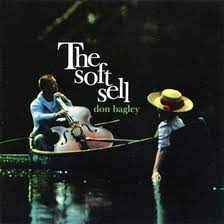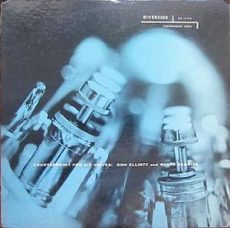
Daily Dose Of Jazz…
Walt Weiskopf was born in Augusta, Georgia on July 30, 1959 and grew up outside of Syracuse, New York. His father, a physician by profession, was also a serious classical pianist. Classically trained, it wasn’t the albums of Al Hirt or Herb Alpert his mother brought home but Miles Ahead that turned his attention. Already filled with Charlie Parker, Stan Getz, Dexter Gordon and John Coltrane at 14 he set his sight in earnest on jazz. At 16, he began playing alto saxophone in a local big band alongside the great tenorist J.R. Monterose, who became his first mentor.
Heading to the Eastman School of Music in Rochester, New York, Walt acquired a B.A. and after a move to New York City at twenty in 1980 he made a name for himself in jam sessions and was drafted into the Buddy Rich Big Band, adding tenor to his arsenal. By 1983, he began a 14-year association with Toshiko Akiyoshi, touring and recording with her jazz orchestra and small group.
The late ’80s, saw him playing with and writing for his first quartet that included his brother Joel, bassist Jay Anderson, and drummer Jeff Hirshfield. In 1989, he released his debut album as a leader, Exact Science, with that band. A sextet album followed as his sophomore project with Conrad Herwig, Andy Fusco, Joel Weiskopf, Peter Washington, and Billy Drummond. This began a long association with Criss Cros,s Jazz in which eleven albums were recorded and released.
His latest project, the debut of the European Quartet takes him further into his composing, arranging and thematic compositions. The group has released a number of albums, such as Worldwide, Introspection and Introspection 2.0, and a three song ep A Little Christmas Music.
As outstanding as this output is and all of his efforts as a sideman are (he is especially great on Billy Drummond’s Dubai), Weiskopf is best known to many fans for his work with Steely Dan over the past 20 years—before and after the untimely passing of its genius co-founder Walter Becker in 2017.
As an educator he has taught at numerous schools including the Eastman School of Music, Temple University, New Jersey City University and the New School. He published numerous books, Intervalic Improvisation, Around the Horn, and Understanding the Diminished Scale. Moving to Virginia, he retired from teaching and working commercially and is concentrating on practicing and composing.
Tenor saxophonist, composer, arranger and educator Walt Weiskopf, who was a 20 year staple of the studio-only jazz rock fusion band Steely Dan, continues to push the realm of his music.
More Posts: arranger,bandleader,composer,educator,history,instrumental,jazz,music,saxophone

Daily Dose Of Jazz…
Örjan Kjellin was born on July 21, 1944 in Ljungby, Sweden and didn’t pick up the clarinet until the age of 15 and two years later formed his first band in partnership with pianist Lars Edegran. The band played music in the New Orleans style. He made his first records in his native Sweden at the age of 17.
Moving to New Orleans, Louisiana in 1966 he became a regular performer at several leading jazz venues including Preservation Hall. In 1968 he was a founder member of the New Orleans Ragtime Orchestra. He also led his own bands in the city including, in 1970, a band which held a residency at the Maison Bourbon Club. Two years later he formed the New Orleans Joymakers.
He recorded with several veteran New Orleans musicians including Josiah ‘Cié’ Frazier, Preston Jackson, Jim Robinson, Jabbo Smith, Zutty Singleton and Kid Thomas Valentine. In 1978, Örjan played with NORO for the soundtrack of the movie Pretty Baby. The following year he appeared in New York City as musical director, co-arranger and on-stage clarinetist with the stage musical One Mo’ Time.
In the early 80s he appeared with the same show during its long and successful run in London’s West End. Kellin has toured extensively with his own bands and with bands formed largely from New Orleans veterans. In 1992 he made his first solo tour of the UK.
Clarinetist Örjan Kjellin, a gifted and highly musical player who is known to the jazz world as Orange Kellin, continues to fan the flames of the music of New Orleans.
More Posts: arranger,bandleader,clarinet,history,instrumental,jazz,music

Daily Dose Of Jazz…
Donald Neff Bagley was born on July 18, 1927 in Salt Lake City, Utah and received formal training on the double bass. He went on to study in Los Angeles, California and played in 1945 with Shorty Sherock and Wingy Manone, and in 1948 with Dick Pierce.
During the early Fifties from 1950 to 1953, and sporadically thereafter, Bagley played with Stan Kenton. HIs time with Kenton, A Study for Bass by Bill Russo and Bags by Bill Holman were written to feature Bagley’s playing. By 1954 he was fronting his own ensembles. His session work between 1950 and 1952, Don worked extensively with Nat King Cole, Maynard Ferguson, and Dexter Gordon. He played in Europe with Zoot Sims, Lars Gullin, Frank Rosolino, and Åke Persson. He would go on to work with Les Brown, Jimmie Rowles, Shelly Manne, Pete Fountain and Phil Woods. In 1957 and 1958, he recorded three albums under his own name.
The Sixties saw him playing with Ben Webster and Julie London. Into the 1970s and 1980s he worked with Burt Bacharach while composing and arranging for film and television, including the scores to Mama’s Dirty Girls, The Manhandlers, The Swinging Barmaids, The Student Body, Young Lady Chatterley and Sacred Ground.
Double bassist, composer and arranger Don Bagley transitioned of natural causes on July 26, 2012 at the age of 85.
More Posts: arranger,bandleader,bass,composer,history,instrumental,jazz,music

Daily Dose Of Jazz…
Brenda Hopkins Miranda was born July 14th, and raised in San Juan, Puerto Rico. Her childhood was filled with sounds from all over the world and from an early age her profound sensibilities led her to intuitively reject stylistic boundaries. She began her musical path at the age of five with piano, ballet and painting lessons at Bonneville School. Her remarkable talent got her admission to the Conservatorio de Música de Puerto Rico to begin undergraduate studies in Classical Piano at 16 while still attending high school.
Holding a Bachelors Magna cum Laude degree in Classical Piano from the Conservatorio, she was awarded a Berklee School of Music scholarship, received a Masters degree with honors in Contemporary Improvisation from New England Conservatory, and completed Doctoral Studies in Musicology at the Universidad de Granada in Spain.
As a bandleader Hopkins Miranda has released six recordings between 1998 and 2017 with her last four albums making the top 20, with three of them in the top 10 and two in the top 5 album list. A recognized composer and artist on several short films and documentaries, throughout her professional career she has been active as a first call pianist on international tours for a host of Latin American artists like Ricardo Montaner, Gilberto Santa Rosa, Marco Antonio Muñiz, Pandora, Ednita Nazario, Glenn Monroig, Yolandita Monge and many others.
In 2006 Brenda moved to Granada, Spain for two years to pursue a PHD in musicology at the Universidad de Granada. She successfully auditioned. Brenda is also a groundbreaking pioneer in education. She was the winner of the Gilles Boulet 2014 first prize and medal awarded in Florianopolis, Brazil by the Interamerican Organization for Higher Education and has created over 300 creativity exercises for musicians. Brenda gives music creativity workshops all over the world.
Pianist, composer, arranger, improviser, bandleader, and producer Brenda Hopkins Miranda currently is a professor at the Universidad Interamericana Recinto Metropolitano Music Program. She continues to perform.
More Posts: arranger,bandleader,composer,educato,history,instrumental,jazz,music,piano

Daily Dose Of Jazz…
Lyle “Rusty” Dedrick was born on July 12, 1918 in Delevan, New York. His first call to jazz came when he was in a music store in Buffalo, New York and heard a Louis Armstrong record. So taken was he that he bought the record, then returned home to save money for a record player. After brief studies at Fredonia State Teachers College, he spent a two-year jazz apprenticeship working with the band known as “Mr. And Mrs. Swing,” the Red Norvo/Mildred Bailey Orchestra, featuring the arrangements of a young Eddie Sauter.
He followed this with two stints with Claude Thornhill (1941-42 and 1946-47) and the chance to play a book by Gil Evans. This experience, plus private studies with Paul Creston and Stefan Wolpe, were good preparation for a long career in the New York City jazz commercial music field.
His credits included writing and/or playing with Maxine Sullivan, Lee Wiley, Lionel Hampton and others, along with radio and television studio work with Arthur Godfrey, Ed Sullivan, Sid Ceasar and more. At the same time, Rusty was recording his own LPs.
In 1971 Dedrick joined the faculty of the Manhattan School of Music as Director of Jazz Studies. He guest conducted many all-county high school jazz bands, as well as the prestigious American Jazz Orchestra. Swing and bebop jazz trumpeter, arranger, composer and educator Rusty Dedrick, who recorded three albums as a leader, transitioned on December 25, 2009 in Summitville, New York
More Posts: arranger,bandleader,composer,educator,history,instrumental,jazz,music,trumpet


